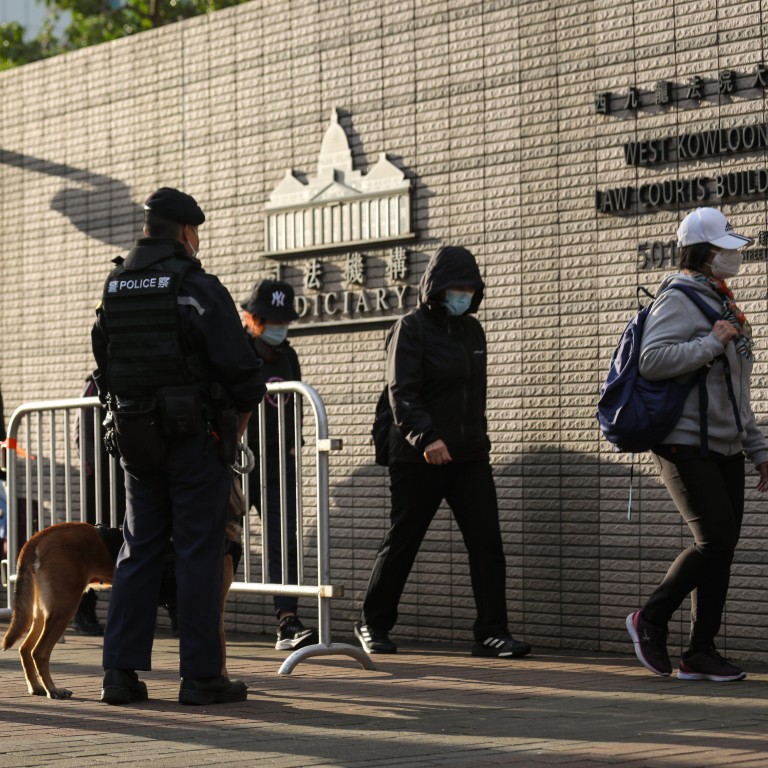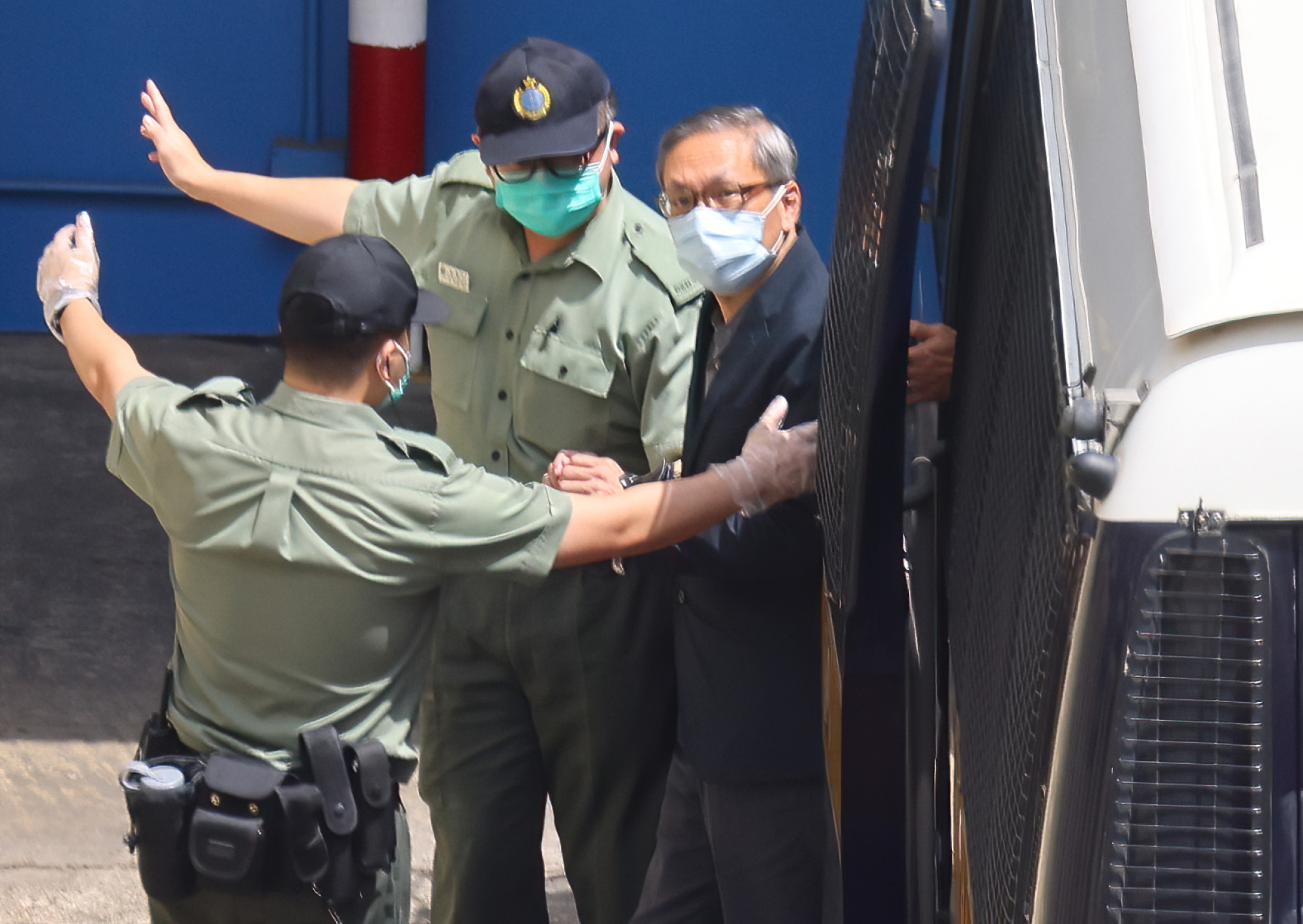
Hong Kong’s Jimmy Lai vowed to keep up US sanctions calls after security law introduced, urged Apple Daily to keep ‘pro-resistance’ approach, court hears
- Ex-publisher Cheung Kim-hung says Jimmy Lai was undeterred by 2020 introduction of national security law, urging focus on mainland China coverage in English edition
- Media tycoon maintained tight grip on platform, launched a month before law came into affect, witness says
“Mr Lai told us not to be afraid and carry on with what we had been doing,” he told West Kowloon Court. “So I managed Apple Daily and hosted [weekly] meetings according to Lai’s original [editorial] directions.”

Cheung told other senior management staff that Lai displayed “great fighting spirit” despite being locked up.
Lai, 76, has denied two conspiracy charges of collusion with foreign forces under the Beijing-decreed national security law, and a third count of conspiracy to print and distribute seditious publications under colonial-era legislation.
One of the foreign collusion charges targets an alleged anti-China campaign linked to Apple Daily, over which Lai was said to have had complete editorial policy control.
Cheung recalled a senior management meeting in mid-2020 when Lai “casually” talked about how busy he was handling interview requests from foreign media agencies.
“I remember the whole of May [2020] was very tense, especially after the National People’s Congress Standing Committee said it would draft the national security law [for the city],” he said.
“Mr Lai said he was not afraid and would continue to say whatever he needed to say, including his hope for US sanctions on China.”
Jimmy Lai used articles to push anti-China agenda in US, Hong Kong court hears
A live broadcast interview with Lai, dated July 2020, showed the tycoon pledging to stay in Hong Kong while refusing to bow to the pressure of the national security law.
“I cannot be afraid, because if I’m afraid, I won’t be able to say or do anything,” Lai said. “If I’m intimidated, I would be useless. If I’m useless, I may as well die.”
Cheung said the tycoon pushed back against suggestions to diversify content and insisted the spotlight be cast only on mainland China to keep a sharp focus.
“The national security law was in effect, and Mr Lai felt that Hong Kong and Apple Daily were hanging by a thread, so he had a tight grip on the English version,” the ex-publisher said.
Messaging records submitted to the court suggested Lai was displeased to see the platform run an article in August 2020 about the United States presidential election.
“Do we need this kind of news that has nothing to do with China and all major English newspapers have published it?” Lai said in a message addressed to Fung Wai-kong, then managing editor of Apple Daily’s English edition.
Fung countered by saying that publishing a variety of international news stories was necessary for “a full-fledged news channel”, but Lai was not convinced.
“I don’t think this kind of news is needed since whenever they come, their local news media should have covered it. I rather think that we should focus on Chinese news and be known for it without dilution,” Lai said.
Cheung recalled seeking Lai’s permission to publish “soft” articles on the English platform, covering topics such as food, travel and culture.
The Jimmy Lai trial so far: daily updates on his Hong Kong national security case
Mr Justice Alex Lee Wan-tang, who is among three High Court judges on the bench, questioned whether Lai had overstepped his authority, but Cheung noted it was normal for media outlets to have their own stances and editorial policies.
Prosecutors highlighted four English articles published by Apple Daily which they deemed offensive.
Another article by Germany-based Hong Kong activist Glacier Kwong Chung-ching slammed the high-profile arrests of 53 leading opposition figures in January 2021, comparing it to Taiwan’s crackdown on democracy advocates during its martial law era in 1979.
Hong Kong media tycoon Jimmy Lai told staff to run ‘pro-resistance’ stories: trial
Cheung said those critiques were in line with Lai’s request for the tabloid to draw foreign readers’ attention to the central government’s “oppression”.
The court heard Lai had instructed Apple Daily to waive classified page advertisement fees for small “yellow” businesses when they first appeared in the tabloid.
Cheung said the tycoon was supportive of the coalition and felt it could allow Hongkongers’ “struggle” to continue after 2019.
Separately, in a text message from Cheung to the tabloid’s then editorial writer Yeung Ching-kee in August 2020, the former said it would be “inconvenient” for the paper to pay royalties to overseas contributors facing allegations of national security law violations.
“Mr Lai’s instruction was that we could still run their articles, but if [we] did not want people to make a mountain out of a molehill, we should not pay them royalties,” Cheung said.
Lai felt that those in “exile” could still arouse the sympathy of local readers and speak up for Hong Kong from abroad, the witness added.
The prosecution is expected to pose its final questions to Cheung when the trial resumes on Friday.
